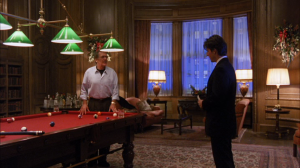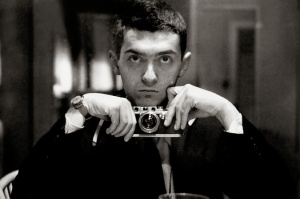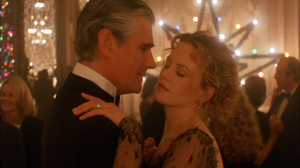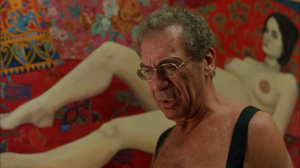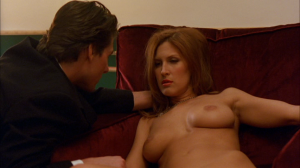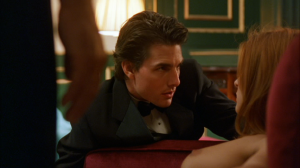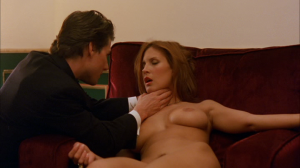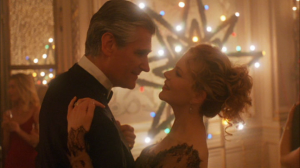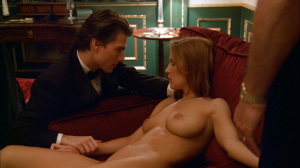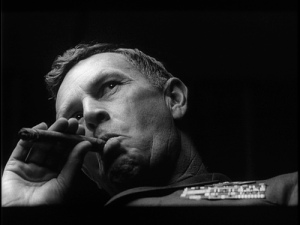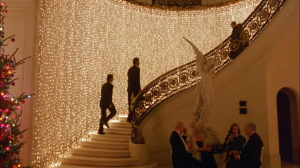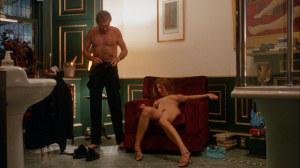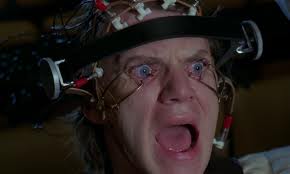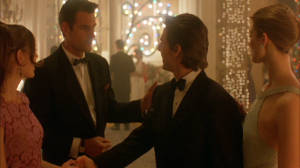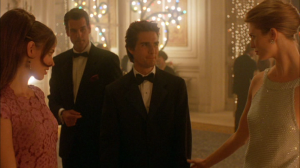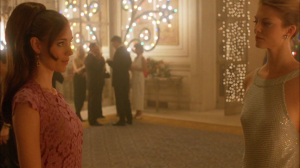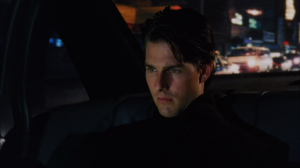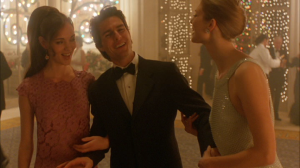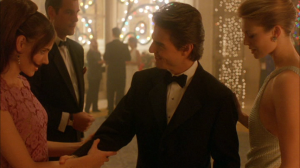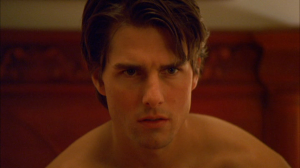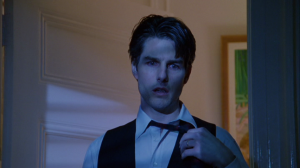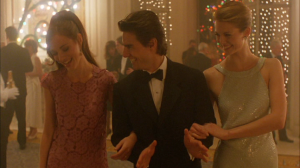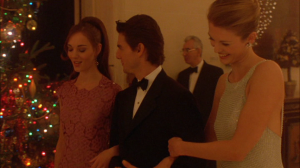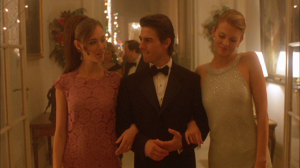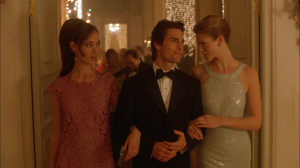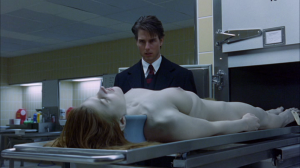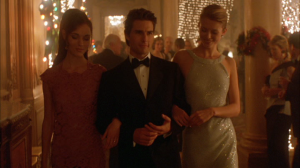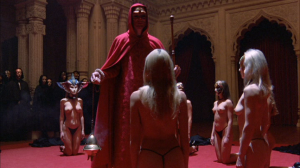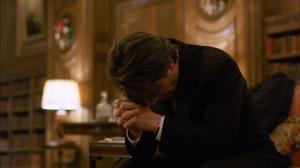Back, now, to Alice and Sandor, spinning giddily around Victor’s dancefloor. But, as with all well-wrought cross-cutting narrative, the intervening events completely change the scene’s mood and theme. For one, we know that this magical, seductive party is hosted by an unabashed rapist. All those golden lights, those soaring columns, Nick’s band–all paid for by rapist-money. Kubrick was an expert at tracing individual sins as they corrupt wider institutions, and does so with uncharacteristic subtlety here.
How so? Let’s map out the evening’s structure, a tour through what Eyes Wide Shut superfan Jeffrey Scott Bernstein calls “Stations of Amorous Love.” We begin with Bill and Alice Harford, the Happy Couple™, although the latter has already let hints of her dissatisfaction slip. They meet and greet Victor and Ilona Ziegler, who seem like an older, wealthier version of the Harfords; they’re even shot as parallels. So time itself seems to relent before the Harfords–they are seeing their future, and it’s a palatial mansion full of seductive guests. What could be better? But the cracks appear, bit by bit: Bill encounters Nick, reminding him of his single, pre-doctor days (which Nick doesn’t seem to have given up), while Alice goes off on her own and meets Sandor, offering her a tantalizing future paralleled with Bill’s unearthed past. Bill then appears to bump randomly into Gayle and Nuala, who remind Bill of another bygone flirtation (Gayle, Rockefeller Plaza, something in her eye), and offer a counterpoint seduction to Sandor’s: a threesome instead of a coupling, silly and shallow instead of suave and debonair, leading him down a linear hallway instead of whirling him around a dancefloor. And yet, they are all pieces in the same game, and the true nature of that game is revealed upstairs: Victor molesting the drugged Mandy, relying on Bill to help cover it up.
Eyes Wide Shut is about more than an individual or a couple; it is about a society, one separate from but insidiously representative of our own. The movie follows two seemingly contradictory trajectories at once: like 2001, it builds from individuals outward, constructing a picture of a city built on not only abuse, but the covering up of said abuse. What matters in Eyes Wide Shut is less what happens than the fact that what happens is hidden, ignored, willfully forgotten; therein lies the other arc. That is the path inward, surgically prying apart Doctor Bill Harford’s defenses until he is left humiliated, utterly exposed for the ordinary, conflicted human being he is. That is the shock of Eyes Wide Shut: the revelation of the absurd amalgam of contradictory parts that we have somehow agreed to refer to as one coherent “person.” Eyes Wide Shut, made as its director lay dying, somehow manages to be about both Bill Harford and the society through which he moves in equal proportion, as if the master wanted to unleash one last terrible all-consuming vision on his unsuspecting audience, but also let them know he understood how it felt to be a small, helpless individual caught up in that pattern. I’m projecting, of course, but if that was his intention, he utterly nailed it. RIP, you master of the medium, as much as Shakespeare was of theater, or Carlin of stand-up, or, or…
Where was I? Oh, yes, the structure of the night, “Amorous Stations of Love,” yes yes. OK. So I’ll save my conclusions for when the Harfords finally escape this tantalizing death-trap of an evening. For now, enough to note that it’s impossible to take Sandor’s sexy moves at face value any more. Is he any different from Victor? Are his intentions toward Alice any different than his host’s toward Mandy? Remember, Alice has had far too much to drink, and doesn’t seem far removed from Mandy’s vulnerable blackout. (I’ll just point out that both are tall redheads, and again leave further discussion of their insidious commonality for later.)
So our impression of their ongoing dance and flirtation is colored by what Bill’s been up to upstairs, and indeed, Sandor glances enigmatically upward as he prepares to go for broke. “I love Victor’s art collection, don’t you?” Back we go to art! It’s an endlessly recurring motif in Eyes Wide Shut, designed to accomplish several purposes at once. It adds to the film’s layered, synaesthetic beauty, explicitly call attention to the constructed and even deceptive nature of that beauty, and tie the film’s characters into the age-old exploitation of high culture toward base ends: art as a primal display of wealth. That painting in Victor’s bathroom sews all these strands together–immediately striking in its bold colors and frank nudity, satirically reflective of Victor’s treatment of actual naked women, and representative of the wealth by which he subtly intimidates upper-middle-class types like Bill and thereby escapes justice.
And Sandor, by alluding to it, implicates himself in the muted outrage playing out upstairs, even as Kubrick pointedly shoots the two scenes with different, indeed divergent styles (one is the bittersweet dream, the other the grim reality, an early tremor of the tragic horror David Lynch would bring to full fruition with Mulholland Drive). Alice, of course, doesn’t know what Bill and Victor are up to, and is willing to play along with Sandor for the moment. “Yes,” she replies breathily. “It’s wonderful.” Sandor offers a serpentine smile. “Have you ever seen his sculpture gallery?” Alice grins back. “No…” Amusement hangs heavy on her voice, as if she can’t quite believe he’s using art, of all things, as an excuse to go in for the kill. (How different is he from Victor, whose choice of bathroom-painting inadvertently reveals his jet-black soul?) “He has a wonderful collection of Renaissance bronzes.” Here is another of Eyes Wide Shut‘s endless allusions to ancient/classical eras, both directly tying the themes of these individual stories to age-old dilemmas and implicitly comparing the artwork to the characters, who are themselves representatives of their particular time-space corridor (but without the luxury of the eternal frozen majesty of sculpture; again, moving images exist in time, and therefore die). “Do you like the period?” I wouldn’t leap to the obvious menstrual joke there, except that Sandor delivers this line so creepily, all deep purr and leaning in, and I can’t help it. In my defense, I offer Dr. Strangelove as evidence that for all Kubrick’s hyper-intelligent philosophizing, dude loved dumb sex jokes. Who don’t?
“Mm, I do.” We will later learn that Alice loves Van Gogh, a man who knew a thing or two about art being corrupted by the monied powers that be. “I adore it,” says Sandor silkily. Does he? Doesn’t matter, he’s using the great humanist breakthrough in Western art and civilization as a prop to get laid. “The sculpture gallery is just upstairs. Would you like to see it? I can show it to you…we won’t be gone long.”
After so many classic volleys back and forth, Sandor delivers four straight lines to dead air, Alice simply watching and listening and no doubt thinking very hard. The whole rhythm is thrown off and realigned, bringing us along with the characters to the tipping point. Emptiness, the Void, is one of the many pivotal subjects of Eyes Wide Shut, albeit inevitably difficult to define. What is it we are seeing in this moment? Two beautiful people, whirling around a beautiful room, one of whom has just proposed to the other that they put everything that has led to this beautiful moment at risk, for the chance at something better. Of course, it’s all much sleazier than that makes it sound, but it doesn’t really matter; every moment, for Kubrick, is another chance for self- and societal evaluation, regardless of how seemingly tawdry the event at hand seems. Alice has a chance now. She doesn’t take it. “Maybe…not…just…now,” she whispers as she leans in close. It’s so damn tantalizing, not just because it’s super-sexy, but because we are witnessing a future that could have been die and wither away. Eyes Wide Shut seems barely to exist, a particular configuration of socio-economic space-time that forever stands at the precipice of Something Else, but the timidity and inertia of the characters prevents them from taking the full plunge. Kubrick, unlike more simplistic, didactic artists, isn’t saying whether that step into the unknown (micro-echoes of 2001‘s macrocosmic Journey Beyond the Infinite) is good or bad, just that it is an opportunity forsaken, and will forever haunt the timestream proceeding outward from the film’s infamous ending.
Why does Alice say no? Is she genuinely uninterested? Was she eager, not to fuck, but to linger on the possibility of fucking? (There will be plenty of evidence for this interpretation after the momentous events of the following night.) Or is she, at some deep, primeval level, aware of what is going on upstairs? Does she not want to end up like Mandy, a “Renaissance bronze” rendered in flesh and blood, but no less a slave to the acquisitive rule of rich men like Victor, like Sandor, and perhaps (perhaps) like her dear dull husband Bill? That wreath-and-lights star framing her head in the above shot hints that she’s just as trapped as Mandy, or as the woman in Victor’s painting: she is an artfully arranged prize in a man’s, man’s, man’s world.
